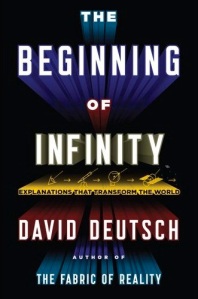 The Beginning of Infinity: Explanations that Transform the World. By David Deutsch. New York: Viking, 2011. 496 pages. Acknowledgments, illustrations, bibliography, index. ISBN: 978-0670022755. $14.50 USD paperback.
The Beginning of Infinity: Explanations that Transform the World. By David Deutsch. New York: Viking, 2011. 496 pages. Acknowledgments, illustrations, bibliography, index. ISBN: 978-0670022755. $14.50 USD paperback.
What explains the workings of the physical world? For millennia humankind has tried to answer that question. Mostly the answers offered have been based on observation. Often those answers have reflected what was known based on the best tools available. Regularly those answers have been incorrect. Always those answers have been incomplete. Such is the nature of the scientific enterprise.
Physicist David Deutsch takes aim at this process of gradually, intermittently, erratically, and haltingly learning more about the way the natural cosmos works. He talks about this process as “progress” but in reality while there has been greater understanding gained over time it was anything but a linear path. Instead, as Deutsch makes clear, learning about the universe has been very much a path of taking one step backwards, two steps forward, and three steps sideways.
In many ways this is a very good book. It takes many disparate disciplines in science—astronomy, cosmology, physics, biology, ecology, evolution, and a range of others—and links them into a crosscutting unity of knowledge. Deutsch always emphasizes the progress being made in understanding, and assures the reader that humans are capable of “infinite progress.” This quest for “godlike” knowledge may be uncomfortable for some but also challenging for all. Can humanity learn things without any limit whatsoever? Might we reach a point where there is nothing left to know? I am reminded of the 1888 statement of Simon Newcomb, the director of the United States Naval Observatory who announced in a similar fit of absoluteness: “We are probably nearing the limit of all we can know about astronomy.” He most assuredly was wrong about that.
But Deutsch does not stop there. He also argues that this achievement of infinite knowledge will also lead to infinite material and moral improvement. He sees the success of modern technology, specifically citing space travel and advances in medicine, as harbingers of a fundamental transition for Homo sapiens to perfection. If we can accomplish all we have done, Deutsch sees no reason to believe that ultimate progress might also be achieved in creating open and tolerant societies and anything else that we choose to accomplish. I must admit that I am taken aback at such statements of absolutes, of the achievement of what could only be called utopia. This is not the first time that such predictions have been made; utopianism abounds. But the challenge is that my definition of utopia and yours may well not be the same.
No question about it, reading The Beginning of Infinity is thought-provoking. I’m pleased to let it rest there. I was taken by Deutsch’s very understandable discussion of the latest in physics, describing dark matter and energy, multiverses, and string theory. His chapter on the philosophy of science and his discussion of artificial intelligence are also quite fascinating. I was less enamored with Deutsch’s incursion into humanistic knowledge and the social sciences. Creativity, free will, and liberalism—all issues he takes up at various points in The Beginning of Infinity—are not nearly as well illuminated in this work. Certainly, he is no expert in those fields and his conclusions relating to them are less useful than other parts of the book.
Accept this for what it is, a very ambitious attempt to unite varieties of knowledge and understanding in a rational philosophy. Enjoy its insights, of which there are many, and read it critically in assessing its larger contribution to understanding.


>’The Beginning of Infinity’ is thought-provoking.
Absolutely. A book that can be re-read and re-read!
Btw, DD doesn’t believe that progress is inevitable. Problems are inevitable and we might, for instance, doom ourselves by choosing to do nothing about some big challenge or other. However, he also doesn’t believe in utopia, or utopias, that they are possible or desirable. If society were somehow to attain a perfect state, progress would necessarily come to a halt and that could only be a bad thing. Although belief in utopia looks like optimism, looked at more closely it’s a form of pessimism, like trying to build or maintain a static society.
It’s there in Chapter 9 but do watch this superb talk about the same ideas:
LikeLike